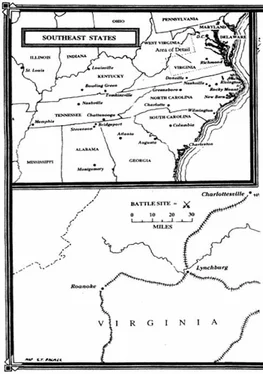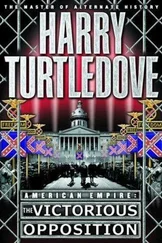Harry Turtledove - The Guns of the South
Здесь есть возможность читать онлайн «Harry Turtledove - The Guns of the South» весь текст электронной книги совершенно бесплатно (целиком полную версию без сокращений). В некоторых случаях можно слушать аудио, скачать через торрент в формате fb2 и присутствует краткое содержание. Год выпуска: 1992, ISBN: 1992, Издательство: Ballantine, Жанр: Альтернативная история, на английском языке. Описание произведения, (предисловие) а так же отзывы посетителей доступны на портале библиотеки ЛибКат.
- Название:The Guns of the South
- Автор:
- Издательство:Ballantine
- Жанр:
- Год:1992
- ISBN:0-345-38468-7
- Рейтинг книги:4 / 5. Голосов: 1
-
Избранное:Добавить в избранное
- Отзывы:
-
Ваша оценка:
- 80
- 1
- 2
- 3
- 4
- 5
The Guns of the South: краткое содержание, описание и аннотация
Предлагаем к чтению аннотацию, описание, краткое содержание или предисловие (зависит от того, что написал сам автор книги «The Guns of the South»). Если вы не нашли необходимую информацию о книге — напишите в комментариях, мы постараемся отыскать её.
The Guns of the South — читать онлайн бесплатно полную книгу (весь текст) целиком
Ниже представлен текст книги, разбитый по страницам. Система сохранения места последней прочитанной страницы, позволяет с удобством читать онлайн бесплатно книгу «The Guns of the South», без необходимости каждый раз заново искать на чём Вы остановились. Поставьте закладку, и сможете в любой момент перейти на страницу, на которой закончили чтение.
Интервал:
Закладка:
Lee had a horror of suicide; to him it seemed the ultimate abandonment of responsibility. Yet the Rivington men were already abandoned like no others in all the world, cast adrift even from their proper time. What had they to live for? He wished he could make their lot easier, but would not put his nation in he’s way for their sake. If that made him partly to blame for their deaths, he would accept the burden. An officer had to learn to do that, else he would never be able to give an order that brought his men within range of the enemy’s shot and shell. And now he was not merely general, but commander in chief.
Reminding himself of that brought his thoughts back to the Senate. How easy it would be if he could simply order the men of the upper house to approve his legislation! But he could not; the Constitution did not permit it. They would make up their own minds in their own good time…and quite probably drive him mad in the process.
Commotion on the grounds of the Presidential mansion. Lee looked up from a letter he was writing to the British minister. Running feet, a sentry’s cry of, “Halt! Y’all halt right now, do you hear me?” After the Richmond Massacre, sentries took their duties more seriously than they had in times past.
Several voices shouted back at the sentry. That garbled any single reply, but one word was repeated often enough to come through clearly. “Vote! The vote!” Lee jumped to his feet and hurried out, the letter forgotten. He’d hoped the vote might finally come today, but past delays had forced caution on him.
Guards stood before the front steps with extended bayonets, holding a squad of reporters out of the residence. The reporters’ yells redoubled when Lee appeared in the doorway. “Fourteen to ten,” one of them bawled above the general din. “Fourteen to ten, President Lee! What do you have to say about that?”
“Fourteen to ten which way, Mr. Helper?” Lee asked, doing his best to hold anxiety from his voice. “You must be aware your response to that question will have some small bearing on the comments I make.”
The man from the Richmond Dispatch laughed, which meant Rex Van Lew of the Examiner got to tell Lee what he needed to know: “Fourteen to ten/or, Mr. President!”
Lee’s breath whooshed out in one long, happy sigh. He’d had remarks ready for this occasion (and another set ready in case he lost), but they all flew straight out of his head. He spoke the first thought he had: “Gentlemen, we are on our way.”
“On our way where, Mr. President?” asked Virgil Quincy of the Whig.
“That we shall all discover in due course,” Lee answered. “But I am heartily glad we have begun the journey.”
“You’ve given up owning slaves yourself, President Lee,” Quincy said. “How will the passage of this bill affect you personally?”
“Aside from making me the most relieved man in Richmond, do you mean?” Lee said, which raised more laughter among the reporters. Through it, he went on,” As you may know, the Constitution sets my salary at $25,000 per annum. I aim to contribute the tenth part of that sum each year into the emancipation fund this legislation establishes, to show I favor it with more than words alone.”
That quieted the reporters, who bent over their pads to write down his reply. After a moment, Edwin Helper said, “How do you feel about the prospect of no more niggers being born into slavery after December 31, 1872?”
“The date I proposed originally to Congress as the terminus ad quem was December 31, 1870,” Lee said. “I accept, with a certain amount of reluctance, its decision to delay that day two years further, but I am forced to concede that the additional period will let us prepare more adequately. I am pleased that Negroes will begin to be freeborn during my term in office, and even more pleased that they shall begin to enjoy their full liberty before the commencement of the twentieth century.”
Rex Van Lew stiffened. at that, like a bird dog corning to point. “There’s been a good deal of talk about the twentieth century all through the debate of this bill, sir. Why worry so much about it now—why talk so much about it now—when it’s still more than thirty years away?”
“Any conscientious legislator naturally has in mind the future of his country, Mr. Van Lew, and speaking of the twentieth century is a convenient way to indicate our course toward that future.” It was, Lee knew, less than half an answer. The twentieth century—and the twenty-first—loomed large in the debate because senators and congressmen were actually able to judge their views, not merely guess at them. But that was a story which ought not to appear in the newspapers.
Van Lew, both clever and persistent, recognized that Lee had been imperfectly frank. He waved his hand again, but Lee pretended not to see him. He pointed instead to Virgil Quincy, who asked, “What will you do with masters who refuse to accept part payment so their slaves can start working to buy themselves free?”
“Congress has passed this bill, I will sign it, and it shall be enforced,” Lee said. “I might add that a majority of our citizens, knowing my views on the matter, chose to invest me with Presidential authority. I construe this to mean they will comply with the law.”
“Don’t you think they voted for you because of who you are rather than your views about slavery?” Quincy asked.
“Who I am includes my views on slavery,” Lee answered. “With that, gentlemen, I fear you will have to rest content.” He went back into the Presidential mansion.
“What about the Constitution, President Lee?” someone shouted after him.
By then, Lee had already closed the door. He could pretend not to hear the question, and he did. He felt brief shame at using a politician’s trick, but stifled it. The plain truth was that his bill violated the spirit of the Confederate Constitution and very likely its letter as well. Opponents of the law had been saying—bellowing—as much for months. He did not care to admit publicly that they were right.
Before he took office, he’d hoped to see Congress get around to establishing a Supreme Court during his term. Now, all at once, he wondered if that was a good idea. Justices would probably overturn the law, or important sections of it, if it came before them for review—and it would. They’d have a harder time doing that if the legislation was well established and working smoothly before they ever got a chance to examine it.
Another politician’s trick, he thought; his mouth twisted in distaste. But however much he hated the idea, he was a politician now, maneuvering against his foes in Congress as he had against the Union army. Deception and misdirection had served his strategy then; no reason not to employ them now.
His servant Julia came into the reception room, a feather duster in her hand. She must have heard the reporters: when she saw Lee, she dropped him a curtsy as elegant as any he’d ever received from a highborn white lady. Without a word, she turned and began dusting the bric-a-brac on a table.
Thus she did not see the deep bow Lee gave in return. Most of the nearly four million blacks in the Confederacy remained slaves; that would be so for many years to come. But Lee tried to look into the misty future, to see how his country would change as more and more Negroes gained their freedom.
He was, at bottom, a deeply conservative man; the principal reason he’d supported the slow beginning of emancipation was in the hope that gradual change would lead to less long-range disruption than the periodic explosions of hatred that had to follow any effort to pretend the time from 1862 to 1866 had never happened. He hoped that blacks, once free, would come to be, and be recognized as, good Southerners like any other.
Читать дальшеИнтервал:
Закладка:
Похожие книги на «The Guns of the South»
Представляем Вашему вниманию похожие книги на «The Guns of the South» списком для выбора. Мы отобрали схожую по названию и смыслу литературу в надежде предоставить читателям больше вариантов отыскать новые, интересные, ещё непрочитанные произведения.
Обсуждение, отзывы о книге «The Guns of the South» и просто собственные мнения читателей. Оставьте ваши комментарии, напишите, что Вы думаете о произведении, его смысле или главных героях. Укажите что конкретно понравилось, а что нет, и почему Вы так считаете.












